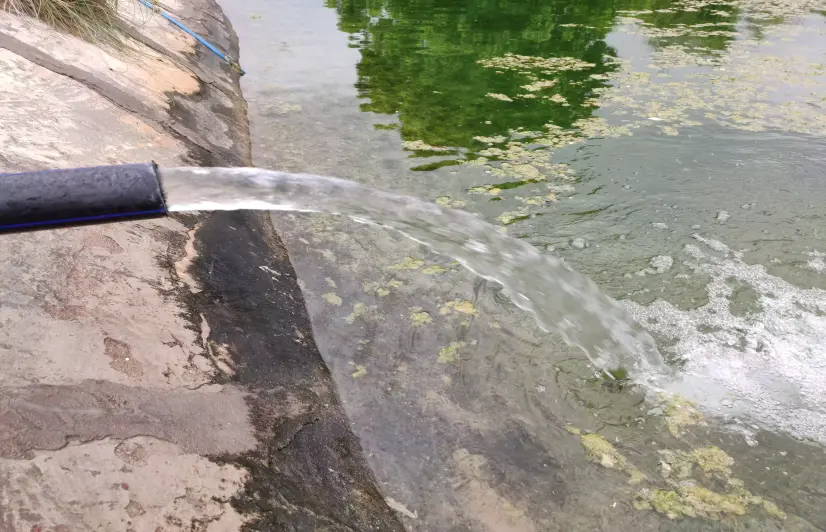For timely completion of irrigation projects, review proposals first: Experts

For timely completion of irrigation projects, review proposals first: Experts
Bengaluru, Karnataka: The recently released Comptroller and Auditor General's (CAG) report on 16 national irrigation projects have revealed patchy implementation, inordinate delays and massive escalations over the past decade. The report states how only five of these projects are under execution, with the remaining 11 yet to start work. Experts and policy makers are of the opinion that along with expenditures, a study of the project proposals is also a must to untangle management flaws.The CAG report shows how failure of project authorities to adhere to the contract norms has led to a whopping Rs 32.16 crore (non-recovery) loss and a cost escalation of Rs 224.54 crore.
Himanshu
Thakkar, water expert and coordinator at the South Asia Network on Dams, Rivers
and People (SANDRP), a group of organisations and individuals working on water
issues, said, “A project should be given ‘national’ status only after its impact on the environment is assessed and its cost-benefit studied, among
other factors. The national auditor should also look at the protocols that were followed before sending proposals for government approval."
The 16 irrigation
projects were brought under the Accelerated Irrigation Benefits Programme in
2008 by the central government. The five projects that are under execution are Indira
Sagar Poolavaram Project, Gosirkhurd Irrigation Project, Shahpur-Kandi Dam project,
Saryu Nahar Pariyojana and Teesta Barrage Project. The CAG report also states how
slow progress of work in the five ongoing projects has resulted in an
escalation of 2,341 %, from an initial estimate of Rs 3,530 crore to the
current Rs 86,172.23 crore. Also,
out of these five, some had commenced work as far back as 1977-83.
Crucial detailed
project reports
One of the
major reasons for delay, as cited by the CAG, is shortage of
sufficient and accurate detail project reports (DPR), which has incurred an additional total cost of nearly Rs 903.67 crore. A DPR is the final document that contains information
about a project’s costs, benefits, impacts and its implementation strategy.
“A DPR is
prepared by the project development authority and is essentially a technical
document. Clearances for a project are given on the basis of a DPR. But the
process of preparation and appraisal of these documents are not transparent.
The Environment Impact Assessment (EIA) and DPRs are not publicly available,
making them less credible,” said Thakkar.
Sripad
Dharmadhikary, coordinator at Manthan Adhyayan Kendra, a centre which analyses,
researches and monitors water and energy issues, said, “Project assessments were made to get clearances, at the cost of overlooking financial, human and
environmental concerns. But the involvement of all stakeholders is necessary for a smooth
functioning of all projects.”
Land
acquisition and statutory clearances
Pulling up the Ministry
of Water Resources, River Development and Ganga Rejuvenation, the CAG had said how in
four projects, out of the five ongoing ones, the process of land acquisition
has not been completed because of unreasonable administrative delays.
Thakkar gave
the example of Indira Sagar Polavaram Project, which has seen the most number
of interruptions in terms of land acquisition and getting clearances. This dam across
Godavari river is under construction in west Godavari and east Godavari
districts of Andhra Pradesh. But its reservoir spreads in parts of Odisha and
Chhattisgarh. “There is no inter-state agreement with Odisha and Chhattisgarh
and the two states have protested against the dam's construction in the Supreme Court. The
environment management plan has not been implemented and there is no submission
of compliance reports. The project has also violated the Forest Rights Act and
there is no study on backwater impact which will affect Telangana,” he said.
Thakkar further
explained, “The purpose of this particular project is to transfer water from
Godavari to Krishna but both rivers are interstate basins. The dispute tribunal
focuses on equal distribution of water between states. However, the Andhra
Pradesh government has termed it an internal project when the dam itself is built
between two states.”
Rehabilitation
and resettlement methods
The national
auditor’s report also pointed out how delayed rehabilitation and
resettlement measures have caused total escalations worth Rs
1,414.26 crore.
“There is not one project that has successfully rehabilitated the displaced people. Our country lacks proper policies to rehabilitate those affected by government projects. Even the few policies that exist are not legally binding,” Thakkar said.
Dharmadhikary
said, “Losses suffered by humans because of delayed projects are massive. The
lives of thousands come to a standstill since welfare schemes to aid
construction of roads, schools, hospitals or laying power lines are stopped.”
Feasibility of dam
projects
According to the CAG report, irrigation potential from the five projects
has only been 37 % whereas power generation and drinking water arrangements
have been nil. Irrigation
potential aimed at from the five national projects was 14.53 lakh hectares but
only 5.36 lakh hectares has been utilised till date.
“Some environmental
hazards were initially overlooked to get benefits of irrigation facilities and
power generation. But when these needs are not fulfilled, building big dams,
which show no signs of completion, makes little sense,” said Dharmadhikary.
Also, four out
of the five ongoing projects have made negligible contribution to irrigation facilities.
The Saryu Project, in Uttar Pradesh, itself contributes to 74% of the irrigation
potential. A scenario such as this also raises concerns about practicability of
these initiatives.
Thakkar further said, “Many
of these projects should not have been approved in the first place by the
Central Water Commission (CWC). But this central body is politically compromised.
It is time the CWC understand that big dams are necessary but it is also
extremely crucial to assess their cost benefits and impact on the environment.”
“Re-engineering
of the projects which are already underway is required to expedite their
completion,” said Dharmadhikary.
Would you like to Support us
101 Stories Around The Web
Explore All NewsAbout the Reporter
Write For 101Reporters
Would you like to Support us
Follow Us On
